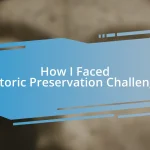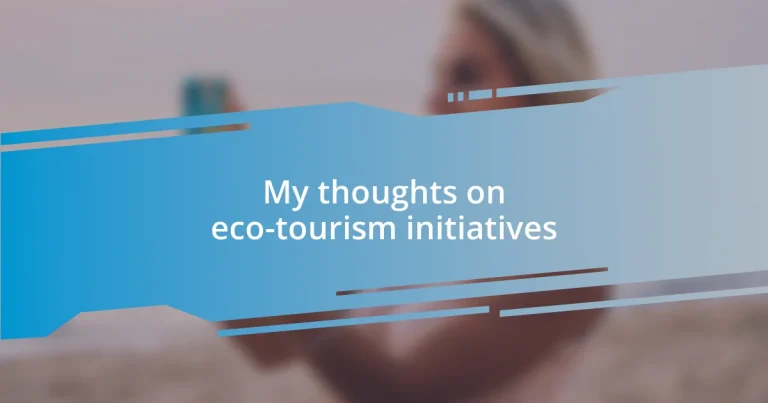Key takeaways:
- Eco-tourism emphasizes responsible travel that conserves the environment while supporting local communities through economic empowerment and cultural preservation.
- Key principles of eco-tourism include minimizing environmental impact, supporting local communities, and enhancing education and awareness among travelers.
- Challenges such as over-tourism, lack of regulation, and unequal benefits for local communities can undermine the effectiveness of eco-tourism initiatives.
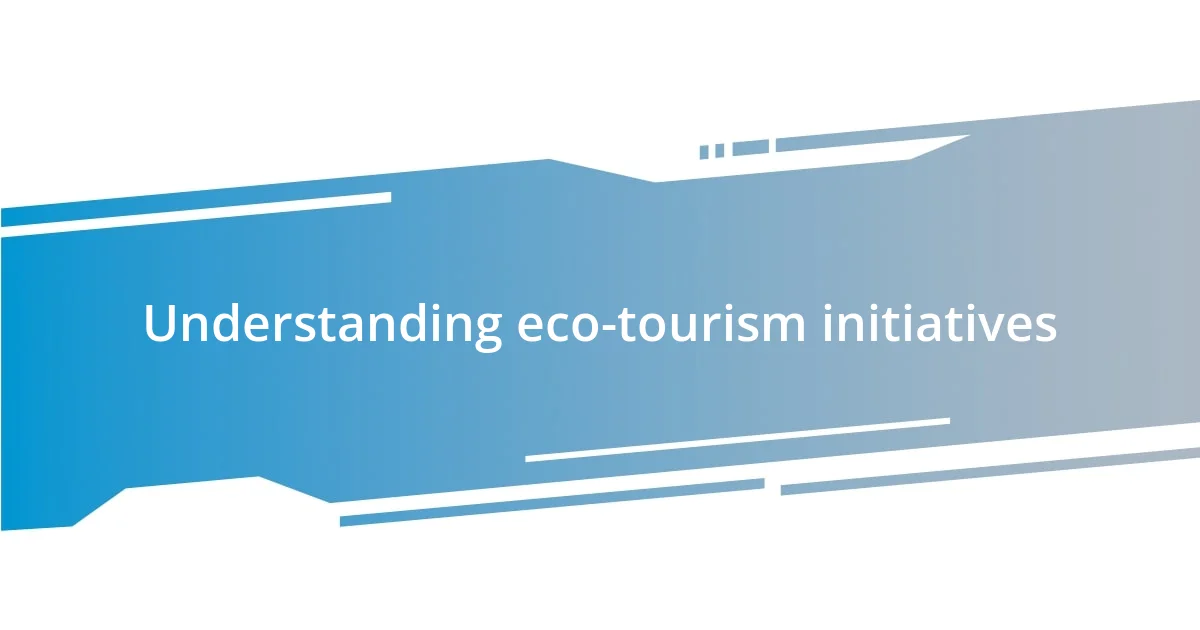
Understanding eco-tourism initiatives
Eco-tourism initiatives focus on responsible travel that conserves the environment and improves the well-being of local communities. I remember my first experience in a small eco-conscious village in Costa Rica, where the locals shared their traditions and sustainability practices with us. It struck me how deeply connected they were to the land; it made me ponder: how often do we consider the impact of our travels on the places we visit?
These initiatives aim not only to protect natural areas but also to foster a sense of responsibility among tourists. I once joined a guided tour that emphasized minimizing waste; the guide actively taught us about the delicate ecosystem we were walking through. It made me realize that we, as travelers, have a unique opportunity to leave a positive mark and support conservation efforts simply by being mindful.
Above all, eco-tourism is about creating authentic experiences while prioritizing environmental stewardship. Have you ever thought about what it really means to travel sustainably? I believe it’s about making informed choices—whether it’s choosing local accommodations or participating in community projects—because each small step contributes to a larger movement towards preserving our planet for future generations.
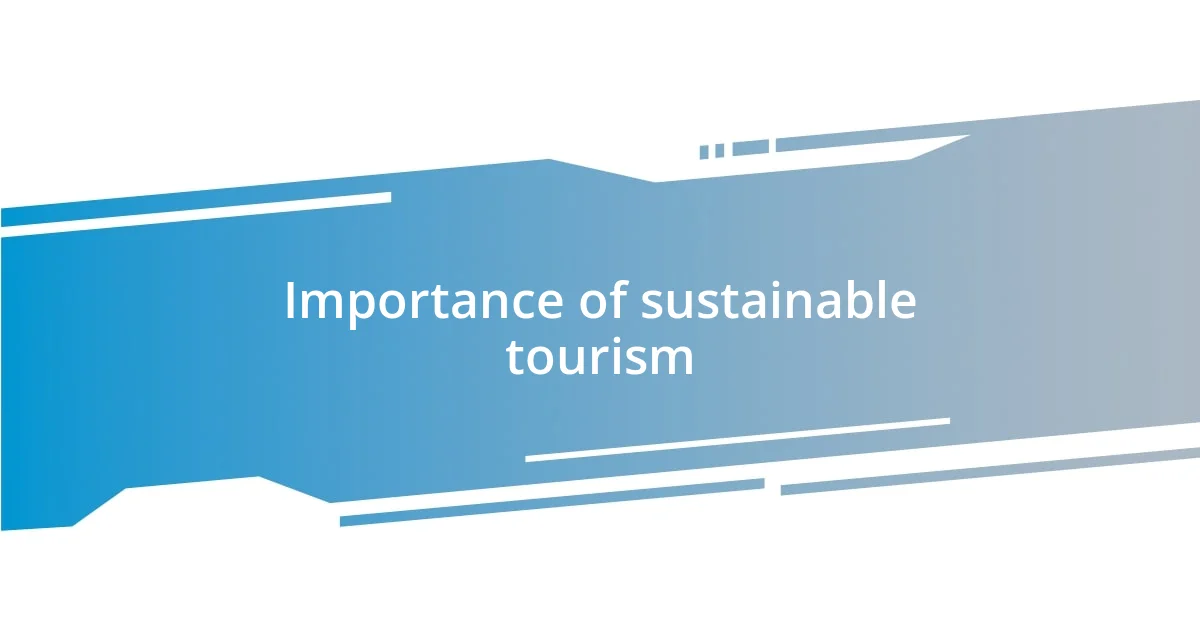
Importance of sustainable tourism
Sustainable tourism is vital for ensuring that the destinations we love can be enjoyed by future generations. My recent trip to an eco-resort in the Caribbean revealed how much care is needed to protect these beautiful environments. I felt a deep appreciation as I learned about the local conservation efforts, which not only preserved the ecosystems but also empowered the community economically. It was a vivid reminder of how tourism can be a force for good, provided we choose to support initiatives that prioritize sustainability.
Here’s why sustainable tourism is important:
- Environmental Protection: It helps conserve natural resources and protect wildlife habitats.
- Community Empowerment: Local communities benefit economically through tourism-related employment opportunities.
- Cultural Preservation: Sustainable practices promote the rich heritage and traditions of local populations.
- Reducing Carbon Footprint: Eco-friendly travel choices minimize the negative impact on the environment.
- Awareness and Education: Travelers are often educated about ecological issues, fostering a deeper connection to nature.
Reflecting on these points, I can’t help but think about the lasting impact our travel choices can have. It’s about more than just vacationing; it’s about becoming a part of the solution. Don’t you agree?
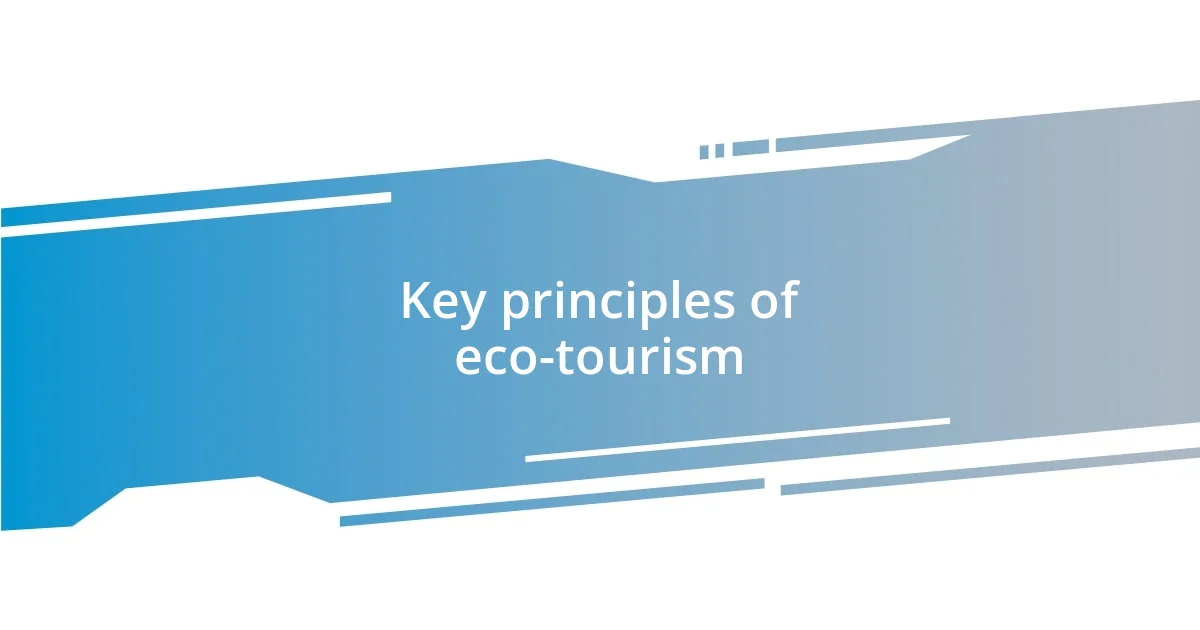
Key principles of eco-tourism
Sustainability is at the heart of eco-tourism and revolves around a few key principles that guide responsible travel. For instance, minimizing environmental impact is crucial. I recall visiting a nature reserve where the tour operators had strict guidelines on noise and waste management. It was refreshing to see how everyone respected the natural surroundings, ensuring we all enjoyed a serene experience without disturbing wildlife.
Another integral principle is supporting local communities. I once joined a cultural workshop that involved weaving and cooking traditional dishes with local artisans. This not only provided me with a more immersive experience but also helped the artisans financially and socially. It made me realize that by engaging with the locals, we can truly appreciate their way of life while contributing to their economic stability.
Lastly, education plays a significant role in eco-tourism. I vividly remember attending a lecture hosted by a conservationist during a trip. The insights about biodiversity loss and its repercussions really struck a chord with me. By understanding the issues at hand, travelers can become advocates for change, sharing knowledge that goes beyond mere enjoyment of the destination. It’s empowering to think that our travel choices can inspire others to consider the ecological consequences of their actions.
| Key Principle | Description |
|---|---|
| Minimizing Environmental Impact | Emphasizes reducing waste and respecting natural habitats during travel. |
| Supporting Local Communities | Focuses on engaging with and economically benefiting local populations through tourism. |
| Education and Awareness | Encourages travelers to learn about ecological issues and raise advocacy for conservation efforts. |

Benefits of eco-tourism for communities
Eco-tourism presents numerous benefits for local communities, transforming the way they engage with their environment. During my visit to a remote village, I witnessed firsthand how the influx of eco-tourists created jobs in hospitality, guiding, and crafting. Recognizing that their livelihoods were tied to the health of their surroundings instilled a sense of pride in the residents—something truly special to observe.
Moreover, I remember exploring local markets filled with crafts made by artisans who thrived on eco-tourism. Each purchase directly supported their families, enhancing their quality of life. Isn’t it amazing how our choices as travelers can elevate these communities? By consciously choosing where we spend our money, we not only enjoy authentic experiences but also encourage the preservation of their unique cultures and traditions.
The emotional connection formed through eco-tourism can’t be understated. One evening, I shared stories with a local family over a traditional dinner, and I felt their gratitude for sharing their world with me. It made me realize that eco-tourism creates bonds beyond mere transactions. It fosters mutual respect and understanding, enriching the traveler and the host alike. Isn’t it rewarding to think that by choosing eco-friendly options, we’re contributing to something bigger?
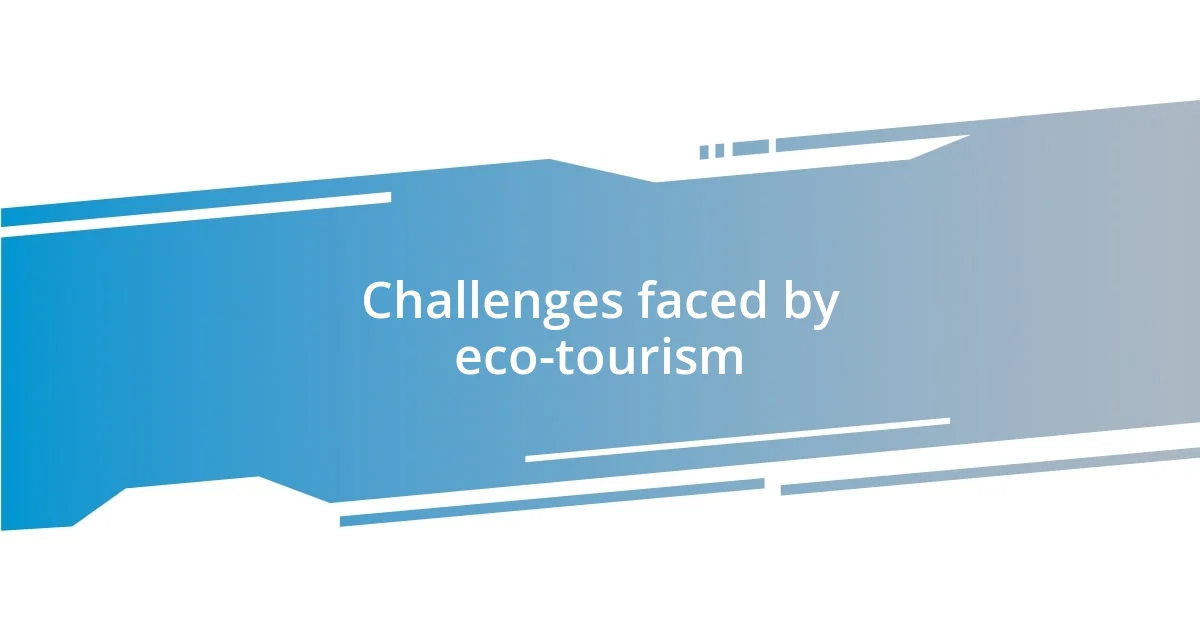
Challenges faced by eco-tourism
Eco-tourism, while promising, faces significant challenges that can hinder its effectiveness. For example, during a hiking trip in a popular eco-destination, I noticed an overwhelming number of tourists encroaching on delicate habitats. This got me thinking—how can we truly call it eco-tourism if our presence leads to over-tourism? The balance between attracting visitors and protecting these natural spaces is a fine line that needs careful management.
Another issue that often surfaces is the lack of proper regulation within the eco-tourism sector. I remember a conservation program I joined that aimed to preserve local wildlife, but many tour operators seemed unaware of or uncommitted to the guidelines. It raised a question for me—how can travelers advocate for sustainability if the very services they rely on don’t abide by ethical practices? Without accountability, eco-tourism risks becoming just another buzzword, losing its core mission.
Lastly, I’ve witnessed that not all local communities see the benefits of eco-tourism equally. On one of my trips, I met locals who expressed frustration about the profits not staying within their communities. They raised a poignant point: if eco-tourism is meant to empower, why are they not reaping the rewards? This disconnect can create resentment, ultimately undermining the very essence of eco-tourism, which is about mutual respect and shared prosperity.
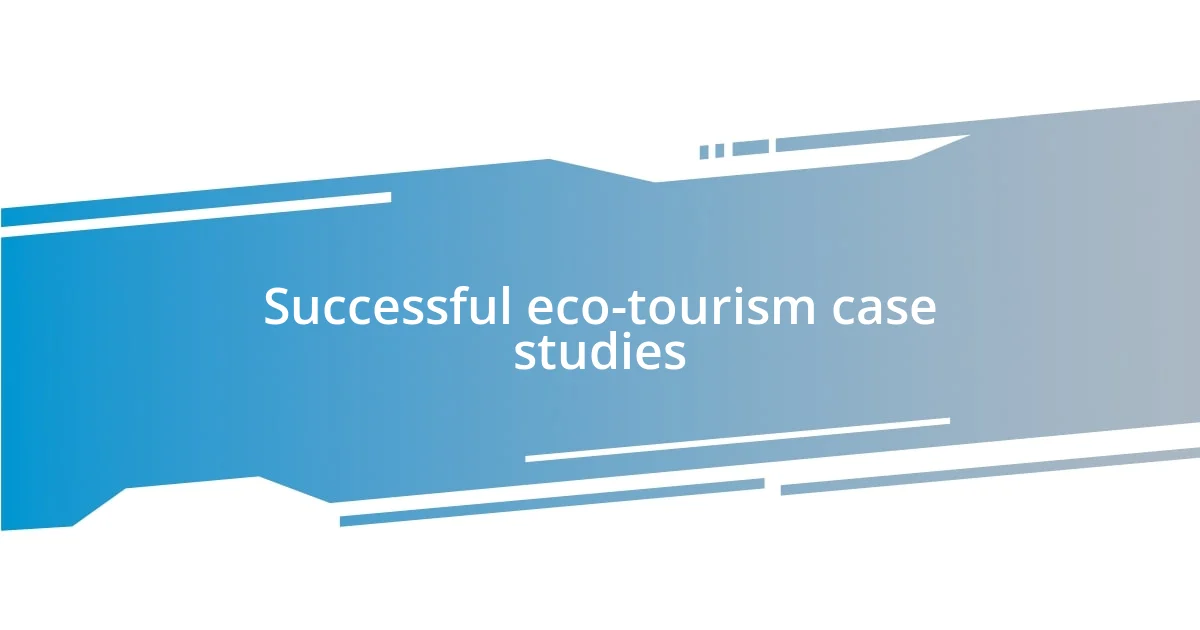
Successful eco-tourism case studies
While exploring Costa Rica’s Monteverde Cloud Forest, I encountered a remarkable eco-tourism initiative that transformed the local environment and economy. A community-run project focused on sustainable coffee farming not only improved their agricultural practices but also invited tourists to experience the process firsthand. I’ll never forget sitting in the shade of coffee plants, sipping a freshly brewed cup while locals shared their stories—the pride in their voices was palpable. It made me wonder: how many places could benefit from such a model of tourism that intertwines education and environmental stewardship?
Take, for example, the case of the Maasai Mara in Kenya. Here, eco-tourism efforts are intricately linked to wildlife conservation. I had the privilege of witnessing this collaboration firsthand during a safari that supported anti-poaching initiatives. The local Maasai communities had formed partnerships with conservation groups, ensuring that a portion of the tour fees went directly to protecting their land and wildlife. This not only generated income but also reinforced their role as custodians of the land. Isn’t it inspiring to see how these arrangements create both economic opportunities and vital conservation efforts?
Lastly, I find the success story of New Zealand’s eco-tourism fascinating. When I visited, I was struck by how the country had developed a network of eco-lodges that prioritize sustainability while providing immersive experiences in nature. This model not only respects the land but also offers travelers authentic adventures—from kayaking in pristine waters to hiking in untouched reserves. Reflecting on my experience, the strong commitment to eco-friendly practices made me think: could this model pave the way for a new standard in global tourism?
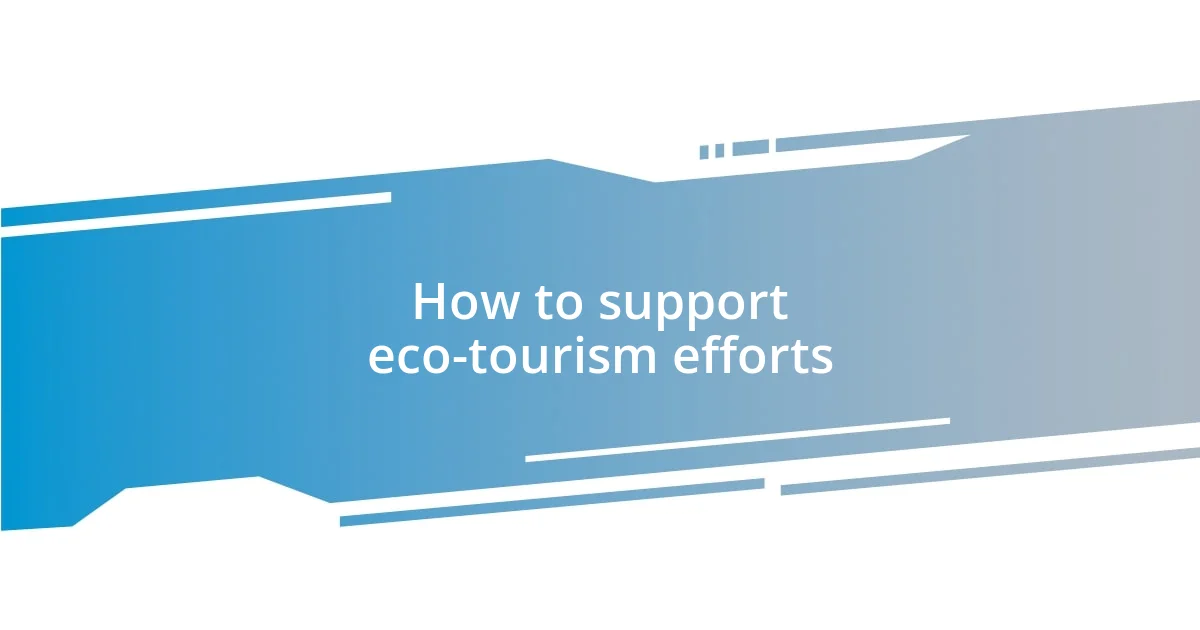
How to support eco-tourism efforts
Supporting eco-tourism initiatives starts with making informed choices as a traveler. I recall a trip where I consciously sought out local guides who practiced respectful interactions with nature. It felt great knowing that my contributions went directly to the community. Supporting businesses that prioritize sustainability is a powerful way to ensure that tourism has a positive impact.
Another impactful step is to educate yourself—and others—about the environmental and cultural significance of the locations you visit. I once participated in a workshop led by local conservationists where we learned about the area’s delicate ecosystems. The knowledge I gained deepened my appreciation for the land and its inhabitants. Have you ever thought about how sharing such insights with fellow travelers can enhance their experiences, too?
Finally, advocating for responsible tourism practices is crucial. I remember discussing eco-friendly practices on social media after a memorable travel experience. Encouraging friends to choose eco-conscious accommodations or participate in conservation activities inspired meaningful conversations. How might your influence lead others to follow this path? Reflecting on these moments reminds me that every small action contributes to a larger movement toward sustainable travel.











